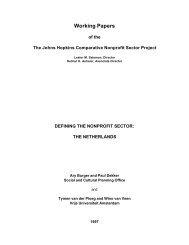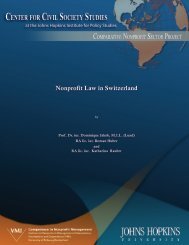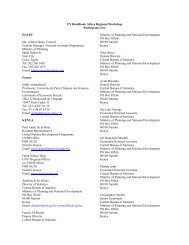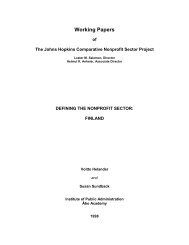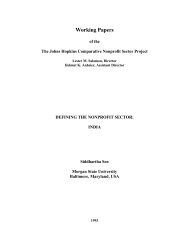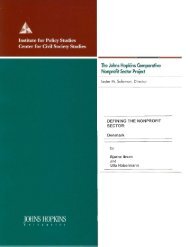Defining the Nonprofit Sector: Argentina
Defining the Nonprofit Sector: Argentina
Defining the Nonprofit Sector: Argentina
Create successful ePaper yourself
Turn your PDF publications into a flip-book with our unique Google optimized e-Paper software.
Campetella, González Bombal, and Roitter<strong>Defining</strong> <strong>the</strong> <strong>Nonprofit</strong> <strong>Sector</strong>: <strong>Argentina</strong>public affairs. An economic perspective highlights <strong>the</strong> potential of nonprofits for <strong>the</strong> provision ofwelfare services, given <strong>the</strong> economic crisis and retreat of <strong>the</strong> state. Until very recently, <strong>the</strong>se twoperspectives gave rise to organizations with opposing operational styles. While <strong>the</strong> former gave birthto organizations bearing a pronounced non-governmental character, <strong>the</strong> latter included organizationsclearly inserted in governmental networks for <strong>the</strong> provision of social services. In recent years, <strong>the</strong>idea of a third sector in which both perspectives could converge is gaining support, and meetingplaces for both types of organizations are emerging. 23In <strong>the</strong>se times characterized by change and transition, we believe that even though thoseorganizations operating on <strong>the</strong> basis of a political perspective must continue to fight for <strong>the</strong> fullrespect of civil and human rights, <strong>the</strong>y must also learn how to combine <strong>the</strong>ir non-governmentalcharacter with <strong>the</strong> exercise of <strong>the</strong>ir right to establish relations with <strong>the</strong> public sector. On <strong>the</strong> o<strong>the</strong>rhand, those organizations linked to <strong>the</strong> provision of social services must not neglect <strong>the</strong> social,political and economic consequences implied in <strong>the</strong> partnership model in a transitional society suchas <strong>Argentina</strong>. In this regard, several features historically traced in this paper acquire new relevance,i.e., clientelism, <strong>the</strong> centralization of public powers, or <strong>the</strong> blurriness of <strong>the</strong> frontiers between <strong>the</strong>public and <strong>the</strong> private. Concerning this, we believe <strong>the</strong> following to be crucial: (a) <strong>the</strong> creation ofstable institutional settings for cooperation between <strong>the</strong> state and <strong>the</strong> third sector, independent fromeach particular government and (b) <strong>the</strong> creation of contractual guarantees and mechanisms of publicaccountability and transparency regarding <strong>the</strong> management and distribution of funds.Likewise, legal and tax reforms are crucial. The legal framework for nonprofit organizationsin <strong>Argentina</strong> mainly consists of <strong>the</strong> general provisions of <strong>the</strong> Civil Code. However, <strong>the</strong>y areinsufficient considering <strong>the</strong> complex reality and dynamics of <strong>the</strong> sector and thus, a set of ad hoc ruleshas been developed by national and local public agencies. This complex and sometimes overlappingframework creates difficulties for <strong>the</strong> accountability of <strong>the</strong> organizations, <strong>the</strong> visibility of <strong>the</strong> sectoras a whole, and <strong>the</strong> possibility of obtaining empirical data.These are several of <strong>the</strong> pending issues for <strong>the</strong> Argentine nonprofit sector. At <strong>the</strong> same time,in order to grasp its origin and development, we think it is necessary to stress <strong>the</strong> historical andpolitical character of <strong>the</strong> social origins <strong>the</strong>ory. It is necessary to consider, for instance, that originscan be re-established, that <strong>the</strong>re are turning points in history, and consequently, that concepts toanalyze <strong>the</strong>se changes must be developed. Likewise, it is necessary to go beyond <strong>the</strong> function of <strong>the</strong>nonprofit sector as provider of social services to include <strong>the</strong>ir relationship to <strong>the</strong> public sphere and<strong>the</strong> political system. Both <strong>the</strong> change and political dimensions have revealed <strong>the</strong>mselves as essentialto an understanding of <strong>the</strong> role and function of <strong>the</strong> nonprofit sector in <strong>the</strong> Argentine case.23Regarding <strong>the</strong>se tendencies, see Thompson (1997).25



